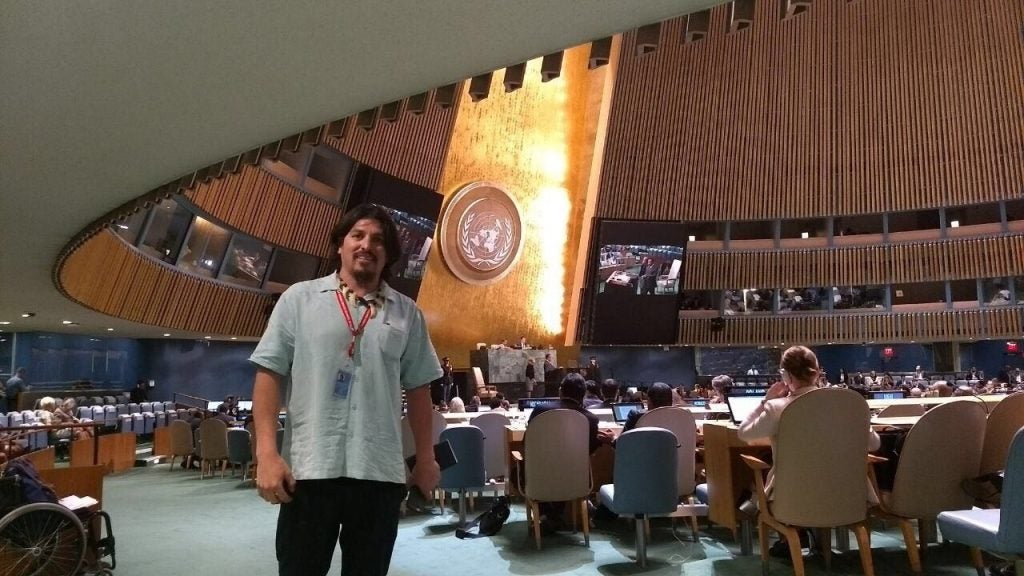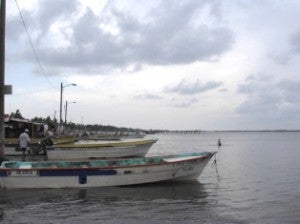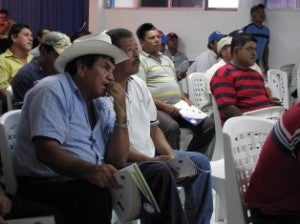On a cold morning, we descend a bumpy dirt road through a forest of ancient alerce trees. As the forest clears, we arrive at a rugged coastline, dotted with fishing villages. The smell of smoke rises through the fog and combines with a salty sea breeze as villagers warm bread over their wood stoves, and fishers ready their boats for a day on the water. For centuries, these Indigenous Mapuche villages have lived off the thriving marine life of the Humboldt Current, a cold upwelling on Chile’s west coast that delivers abundance and a source of food and livelihood from the sea to the whole nation.
EDFish
New hope for Indigenous fishing communities in Chile
Chile’s President reaffirms commitment to marine conservation

Julio Chamarro at the UN
Michelle Bachelet, the President of Chile, reaffirmed her country’s commitment to protecting the marine environment while speaking at a meeting on ocean conservation issues during the annual gathering last week of the United Nations General Assembly in New York.
“Our commitment to the prosperity and well-being of our citizens cannot be disassociated with economic growth,” she said. “But for the same reason, we must accept, once and for all, that long-term growth is not possible, nor is it true development, without an active policy of environmental protection.”
We couldn’t agree more with the President that long term growth is not possible without the protection of the environment. We also believe that working hand in hand with fishermen is critical to building sustainable fisheries, and that economic prosperity is achievable even alongside environmental protections.
That’s why we are excited and inspired to see that President Bachelet invited Julio Chamorro, a lobster fishermen from Juan Fernandez to attend the meeting of the UN General Assembly and present on the importance of marine protected areas and sustainable fishing. Read More
Fishermen Embrace Change in the Sinaloa, Mexico Shrimp Fishery: Part II
The fisherman’s story of frustration with compliance issues under the Sinaloa Shrimp fishery catch share was what I and two of my colleagues continuously heard during our outreach trip in Mexico in July. After spending a month in fishing camps along the Sinaloa coast giving presentations on catch shares and facilitating other exercises to communicate and dissect the issues of fishery management, we believe the fishermen we reached now understand that achieving success through catch share management will take efforts from all the stakeholders: NGOs, government, and most importantly the fishermen themselves.
Although it is easy to become frustrated with the challenges of implementing a new fishery management program, we stressed that real lasting change will take time and that our workshops aimed to empower fishermen to begin solving their own problems with compliance.
One thing that has always interested us is what type of management fishermen would implement if they could choose. To find this out, we played a “fishing game” with three rounds that mimic the problems in the fishery for both the fishermen and the authorities, while inviting fishermen to solve these issues using their own knowledge.
The first round represents the race to fish; the second round a command and control management, and in the third round the fishermen themselves are allowed to make up their own rules. In many cases the third round resulted in some form of catch shares. In response, we communicated that although the realities fishermen face are bleak, without their participation and compliance we will never see the third round in reality.
Implementing catch shares in Mexico has many challenges, and illegal fishing is one main roadblock. In 2009, a historic year for fisheries in Mexico, a TAC was set and shares were allocated for the artisanal blue shrimp fishery. NGOs and government were working together to improve fishery management, something rare in any country.
Though in a land where the laws are written well but commonly disobeyed, it has become clear that with catch shares the story is no different. For this reason it has been of utmost importance for us to maintain contact with the fishermen and continue our presence on the ground. Adaptive management and design continues to be our motto as we work with fishermen to implement innovative solutions and design to confront these challenges.
During our trip, I was a proud catch share cheerleader, and for this shrimp season in Sinaloa we have restored the faith in many fishermen that catch shares equals change. Now we must continue to work with fishermen to help design solutions that will turn theory into practice and implement innovative enforcement programs, which will reward those who are part of a catch share and gather their support as advocates and better stewards of their resource.
Never miss a post! Subscribe to EDFish via a email or a feed reader.
All content is copyrighted. Please do not republish without written permission from Environmental Defense Fund.
Fishermen Embrace Change in the Sinaloa, Mexico Shrimp Fishery: Part I
Over the past two months EDF’s outreach team traveled over 200 miles up and down the coastal state of Sinaloa, Mexico visiting five major lagoons that participated in the artisanal shrimp fishery catch share program. We were all eager to listen to fishermen’s concerns and see first-hand how this new catch share management program was progressing. The artisanal shrimp fleet opened under a catch share management system in September 2009, an initiative of the federal fisheries management authorities – Conapesca and Inapesca, with the support of EDF, WWF, and Noroeste Sustentable – a local Mexican NGO.
Conventional wisdom says that people are generally resistant to change, but what we heard from over 1,000 shrimp fishermen was quite the opposite. In fact, these fishermen want change and are ready to embrace the change that catch shares represents for them and their fishery. Furthermore, EDF’s outreach team was far from the middle aged Mexican male bureaucrat official that is status quo for these fishermen. Without anticipating it, we ended up representing change simply because we were a group of women from all different parts of Mexico coming to talk to them about how to keep their fishery alive and thriving.
It then became our goal to cultivate trust and encourage these fishermen to “keep the faith” that catch shares is a change for the better. This story portrays the sentiments of many fishermen that our team met in dozens of fishing camps.
Imagine you are an artisanal fisherman fishing in the lagoons and bays of Sinaloa, Mexico. You are a member of the same cooperative your father was during his days as a fishermen; you are a proud fisherman because you work alongside family and neighbors on the waters of the once-bountiful Gulf of California – it is your community and your livelihood.
Occasionally you daydream about your father’s fish tales of when the mangrove forests were lush and sprawling and the lagoons were teeming with big blue shrimp. A season’s catch was enough to buy a new pickup truck or take the kids to the doctor and send them to school with new books and tennis shoes. Unfortunately times have changed…
Today mangroves are being cleared for shrimp farms producing smaller, cheaper shrimp that lowers market prices of all shrimp. The lagoons are filling up due to sediment washing down from the growing number of agricultural fields, as Sinaloa has become the largest vegetable producing state in Mexico. As a result, more and more pesticides and other pollutants are entering the lagoons causing shrimp hatches to decline. Last year’s catch barely put food on the table for your family, and your cooperative is battling debt. You feel trapped and know that something has to change if you want to return to those days of plenty. No one is playing by the rules, more and more illegal fishermen are poaching the lagoons, and traditional enforcement efforts are futile.
But, this past year seemed different.
This past fishing season a team of government and NGO representatives arrived in your community to talk to you about catch shares, an innovative management system that establishes a total allowable catch for the fishery and allocates shares to each cooperative with the goal of ensuring a sustainable catch and improving the value of the fishery. Meanwhile, Conapesca has paved a brave new path by installing microchips on all the skiffs, handing out identification cards for all licensed fishermen and sending an independent company to monitor your cooperative’s landings.
You listen attentively in the workshops, and considering your circumstance the arguments are compelling. You speak with your fellow fishermen and everything looks quite promising so you decide to support the transition to catch shares and wait to see how it plays out in practice You prepare your skiff knowing your cooperative is only getting a small percentage of a total number of shrimp that you have to share with 140 cooperatives, 5,988 skiffs and more than 10,000 fellow fishermen.
The season opens and the usual “race to fish” seems to have subsided. Unfortunately though, it is an “El Niño” year so the temperatures seem colder than normal and you are catching significantly less than last year. While the monitoring company appears to be doing their job, you can’t help but notice that many illegal fishermen are still on the water, and can easily land and commercialize their catch – enforcement is lacking. Some of them you can’t blame because they are locals who are just trying to provide for their families. But your frustration mounts as temporary fishermen from other areas, even ones who migrate back from the United States for this lucrative short season, dip into the catch.
You feel robbed because you are playing by the rules, catching your share but know that there are still too many leaks in the system. The season comes to a close and it feels as though little has changed.
Stay tuned for more on the Sinaloa story …












